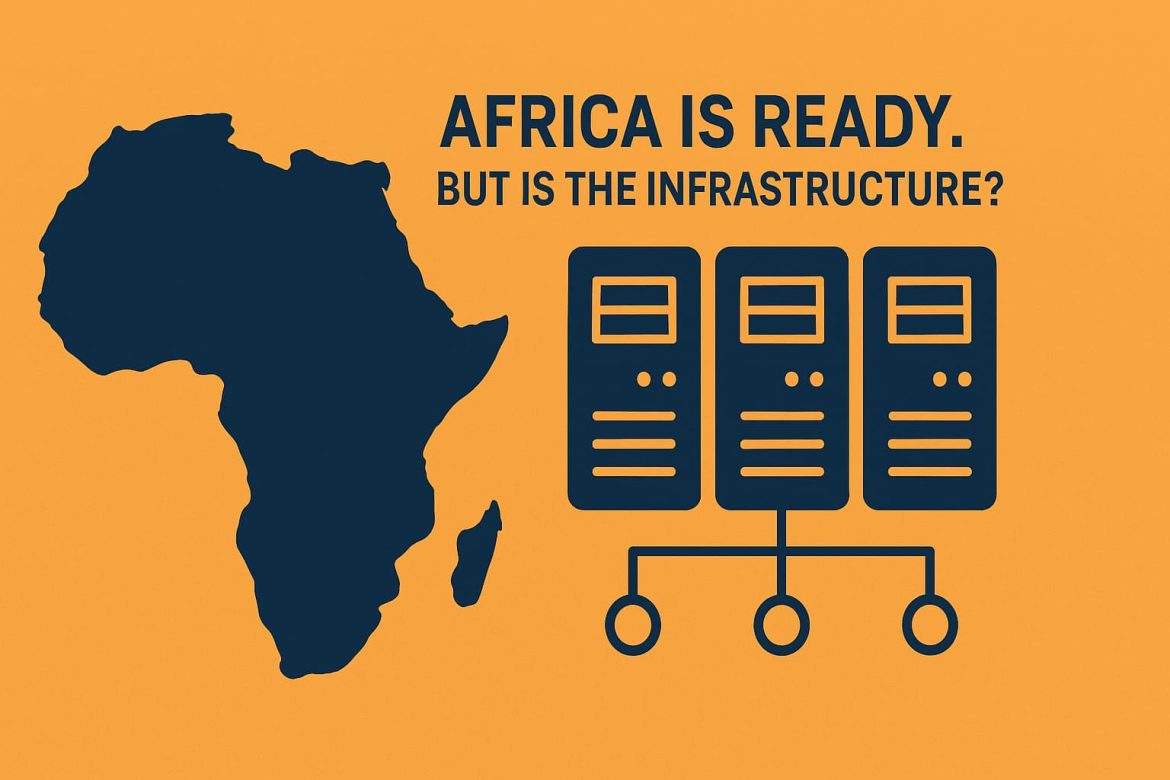Introduction: The Digital Economy’s Invisible Backbone
In today’s global digital economy, infrastructure is the silent power that determines who thrives and who lags behind.
High-speed networks, regional data centers, cloud availability zones, and low-latency connections are what allow fintech, e-commerce, AI, and all digital innovation to flourish.
But in Africa, despite explosive mobile adoption, rapid urbanization, and one of the youngest, fastest-growing populations on earth, there’s one glaring bottleneck: digital infrastructure.
- 90% of Africa’s internet traffic is still routed through servers outside the continent.
- Africa hosts less than 1.3% of the world’s data center capacity, despite holding 18% of the world’s population.
- This means a simple email from Nairobi to Lagos may travel via Europe or the U.S. before returning home.
This offshore dependence slows applications, raises costs, creates regulatory headaches, and limits Africa’s ability to build sovereign digital ecosystems.
South Africa: A Glimpse of What’s Possible
Among African nations, South Africa stands out as the continent’s most digitally mature economy.
Why? Because South Africa has invested – over decades – in telecom infrastructure, data centers, and enabling policies that have attracted AWS, Microsoft Azure, and Google Cloud to set up local regions.
Here’s what that has unlocked:
✅ Fast, Reliable Fintech
Digital-first banks like Capitec scale confidently on local cloud infrastructure.
✅ Advanced E-commerce
Platforms like Takealot handle massive campaigns (like Black Friday) with low latency, rivaling global e-commerce players.
✅ Sophisticated Health & Insurance Tech
Companies like Discovery Health rely on real-time analytics – something impossible with offshore-only hosting.
✅ Thriving Startup Hubs
Cape Town and Johannesburg have become innovation magnets because developers can build on stable infrastructure.
South Africa proves that when infrastructure exists, digital innovation flourishes. But one country cannot carry 1.4 billion people’s digital future.
The question is – can we replicate South Africa’s model across Lagos, Nairobi, Kigali, Accra, Dakar, and beyond?
The Real-World Impact of Africa’s Infrastructure Gap
Here are 10 concrete examples from across Africa showing how the lack of local hosting and cloud infrastructure directly affects businesses and users:
🚀 Flutterwave & Paystack (Nigeria)
Fintech giants processing millions of transactions. But relying on offshore servers introduces latency, especially during high transaction volumes, and raises compliance issues when sensitive data crosses borders.
📱 DukaPlus (Kenya)
A mobile POS for informal retailers that enables sales, credit tracking, and WhatsApp receipts. But syncing and retrieving reports lags during peak retail hours because the backend is hosted abroad. Local hosting could mean near-instant transactions for millions of traders.
🏪 Wasoko (Kenya)
A retail distribution platform serving thousands of shops. Offshore hosting slows inventory syncing, causing supply chain inefficiencies in last-mile delivery.
🚛 Kobo360 (Nigeria)
A digital logistics platform connecting shippers and truckers. Offshore APIs delay dispatch and tracking, undermining real-time logistics.
🛵 SafeBoda (Uganda/Kenya)
A ride-hailing and delivery app. Driver-rider matching lags as API calls travel thousands of kilometers to overseas servers.
🎓 Moringa School & Andela (Pan-African)
Training Africa’s next generation of developers, but students face slow access to cloud labs, repositories, and collaboration tools because regional mirrors are limited beyond South Africa.
🛒 Jumia (Pan-African)
Africa’s biggest e-commerce platform. During mega sales like Black Friday, checkout delays frustrate customers, causing high cart abandonment rates.
🏦 Kwara (Kenya)
A SaaS platform digitizing SACCOs. Rural cooperatives face syncing delays for loan applications and financial transactions due to offshore hosting.
📚 uLesson (Nigeria)
An edtech platform delivering interactive lessons. Live classes buffer and drop out as content streams from faraway CDNs, hurting student engagement.
💳 Kuda Bank (Nigeria)
A fully digital neobank. Transactions and “instant” card issuance are slowed because key backend services are hosted overseas.
Compare these with Takealot or Capitec in South Africa, where locally hosted infrastructure enables near-instant transactions, seamless e-commerce experiences, and scalable cloud-native services.
The Infrastructure Africa Needs Now
1️⃣ Regional Data Centers
Africa needs at least 8–10 regional hubs beyond South Africa:
- Lagos (West Africa)
- Nairobi (East Africa)
- Kigali (Central Africa)
- Accra (Ghana)
- Dakar (Senegal)
These hubs would:
- Cut latency by up to 70%
- Enable data sovereignty
- Lower cloud hosting costs
2️⃣ Pan-African Cloud Infrastructure
We need African cloud platforms that:
- Optimize for mobile-first users
- Cache data at the edge
- Work in low-bandwidth conditions
- Compete with AWS, Azure, Google – but focused on African realities.
3️⃣ Inland Fiber & 5G Backbone
Submarine cables like Equiano and 2Africa bring connectivity to coastal cities, but inland regions remain cut off.
- Investment in fiber networks to secondary cities is critical.
- 5G rollout can leapfrog poor 4G networks.
4️⃣ AI & Compute Hubs
Africa will be a massive AI consumer – but will it be an AI producer?
- Without GPU clusters and local compute hubs, Africa will remain a data exporter, not a digital innovator.
Why This Is a Trillion-Dollar Opportunity
Africa is the fastest-growing digital market:
- 500M new internet users in the next decade
- $180B digital economy potential by 2025 (McKinsey)
- A young population hungry for online services
But without infrastructure, this growth will cap out – and the value will leak offshore.
Investing in servers, fiber, and data centers is not charity. It’s the most profitable long-term play in Africa’s digital future.
Africa Doesn’t Just Need Startups. It Needs Servers.
South Africa shows what’s possible. But it can’t carry the entire continent.
We need:
- Servers in Nairobi, Lagos, Kigali
- Edge networks in Accra and Dakar
- AI compute hubs across East, West, and Central Africa
To Investors:
If you’ve been waiting for the next big African opportunity – this is it.
Not apps. Infrastructure.
- Bet on latency cut from seconds to milliseconds.
- Bet on sovereign African data centers.
- Bet on the next billion digital consumers – powered by African servers.
Africa is ready. Now build the infrastructure it deserves.
